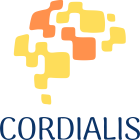
About Cordialis Project
Connecting Remote Areas Through Digital Competences and Cultural Heritage
Cordialis Project
CORDIALIS is an Erasmus+ Project, funded by the French National Agency, Agence Erasmus+ France / Education Formation. The CORDIALIS team worked on opening up remoted areas by quality online exchanges among citizens and by raising awareness on local cultural heritage and crafts.
Duration
30 months
January 2022 – June 2024
Project coordinator
De l’art et d’autre (DADAU)
Partners
University of Turku (UTU), Lithuanian countryside tourism association (LCTA), Web per tutti (Italy)

The COVID 19 health crisis revealed the needs of citizens to use digital tools in education, in many professional and cultural sectors, and unveiled problems of distance communication. While digital tools offer a powerful resource for breaking isolation in times of health crisis, the lack of training in their use can turn these opportunities into real suffering, as many citizens compelled to mobilize digital exchanges and tools revealed.
The project accompanies the transition to a sustainable digital ecosystem of institutions, trainers, professionals and citizens of remote areas who need to develop their digital skills and integrate digital practices in their repertoire of professional, pedagogical, cultural and civic resources.
The project aims to diminish social, cultural or economic barriers which might cause exclusion in the society by a series of modules through the project results. The CORDIALIS tools and resources intend to combine the development of digital competences with the development of other key competences for lifelong learning described by the European reference framework, including communication skills in a foreign language, initiative and entrepreneurship, social and networking skills and cultural awareness.
• Promote and foster the quality of online exchanges in the field of formal and informal education, cultural mediation, and online presentation of local heritage and crafts
• Design tools and manuals for professionals to improve with a particular focus on the problems of motivation, interactivity and group management in distance and virtual exchanges
• Equip citizens and professionals in remote areas with pedagogical tools to detect and fix problems of interaction in online communication
• Improve digital practices and give tools to enhance life-long learning
• Enhance visibility on local heritage and crafts
• Connect people living in remote areas
• Professionals in adult education, language teachers, pre-service teachers, teacher educators
• Adult language learners
• Professionals from the cultural sector (e.g. librarians)
• Craftsmen, artists and local cultural stakeholders
In order to best meet the needs of the target groups and to harness the complementary skills of our consortium, we set up a methodology that crosses approaches and methods from different fields, which do not usually meet.
Our methodology based on the following pillars by:
• Bringing together academics and fieldworkers, we develop a process of applied research where theoretical results can be converted and put into practice
• Crossing the method of conversational analysis with art history and cultural studies allows us to ensure a permanent evaluation in cultural mediation, and consequently, to better respond to the specific needs of the target groups
• Establishing a dialogue between scholars and the actors in the field and local stakeholders, new working tools can reach a very broad public
• Designing art-based, non-formal learning resources, our tools can be better adapted to an adult audience
• Engaging with local and regional artworks and artifacts helps to strengthen cultural identity, contributes to culturally empower people living in remote areas
• Integrating assistive technologies in our tutorials, we empower senior users with advances digital skills
• We created pedagogical tools, manuals, a set of cards in order to enhance interactivity, motivation, and group management and address distance communication questions
• We produced short audio/video podcasts to give practical guidelines for self-assessment and evaluation grids during distance activities
• We designed workshops and prepare virtual exhibitions and cultural visits dedicated to local heritage
• We invented evaluation and self-assessment grids for interaction skills in a virtual exchange situation, supplemented by video tutorials
• We packed all the pedagogical materials developed during the project in a 4-hour training course for professionals in each country
• We prepared video tutorials and podcast for professionals to enable them to use all the tools developed during the project
• We ran workshops and multiplier events to create opportunities for citizens and professionals living in remoted areas to exchange experiences, learn languages and discover local cultural traditions and products
Connecting remote areas through digital competences and cultural heritage
The target groups of the project are: artisans, teachers, professionals in the cultural sector, citizens and language learners
Project Resources
30 months to
– develop manuals, pedagogical cards, audio and video podcasts, video tutorials and assessment grids.
– organize local – regional – international workshops and events
– meet citizens from remoted areas, language learners and teachers, craftsmen, librarians, local cultural stakeholders, etc

CORDIALIS Erasmus+ Project
2021-1-FR01-KA220-ADU-000033544
cordialis.project @gmail.com
The European Commission support for the production of this publication does not constitute an endorsement of the contents which reflects the views only of the authors, and the Commission cannot be held responsible for any use which may be made of the information contained therein.
